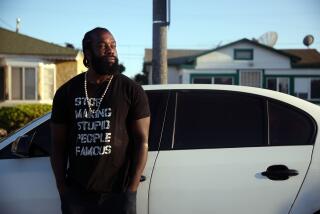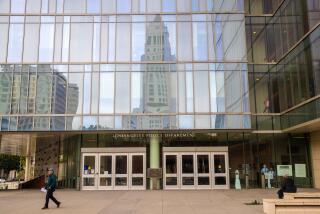Not seeing eye to eye with the LAPD on Ezell Ford shooting
- Share via
Patrol the streets long enough, and you just know when someone is up to no good.
At least that’s what my cop friends tell me — and why we can’t see eye to eye on the case of Ezell Ford.
Ford was shot to death last summer by two LAPD gang officers who were trying to detain him. The Police Department investigated, and Chief Charlie Beck cleared them of wrongdoing.
But the civilian Police Commission disagreed, ruling this week that the shooting violated LAPD policy because Officer Sharlton Wampler had no legitimate reason to consider Ford a criminal suspect when stopping him.
Wampler’s “deficient tactics” led to the fatal altercation, the commission said.
The ruling infuriated some officers, who told their union chief that they are “scared about doing their job right now” because “proactive police work” might get them in trouble.
And it made clear to me why LAPD officials never had a good answer as to why Ford — whose family says he had schizophrenia and bipolar disorder — became a law enforcement target.
“Investigative reasons” was the standard response.
What were the officers investigating? A hunch that Ford might have narcotics in his pocket.
He was walking along the sidewalk, not far from a bunch of gang members hanging out on a corner known as a crime hot spot. He didn’t respond when Wampler called out, “Hey let me talk to you.”
Instead, he slid his hands into his front pockets and sped up, glancing “nervously” at the officers as he walked, according to the investigative report.
That was enough, one of the officers told investigators, “to make me believe that he possibly is in possession of narcotics.”
His “consensual encounter” with Ford “had now become reasonable suspicion to detain this individual.”
::
I don’t know about you, but I get nervous whenever I see the flashing lights of a cop car in my rear view mirror. I slow down, change lanes, make sure my cellphone’s put away. My heart races even when I know I’m not doing anything wrong.
Now I know that being nervous in the presence of a cop is considered a sign that you are — or might be thinking about — committing a crime.
The police commission’s report, available online, shows what goes into split-second decisions that officers make and how difficult and dangerous their jobs can be.
It also shows how hard staying out of trouble can be for a young man unlucky enough to live in an area saturated with gangs and drugs — where a quickened pace or nervous glance can mark you in the eyes of officers as a thug.
The report conveys the officers’ rationale for stopping Ford, but it also points out the sort of concrete evidence they lacked:
They never saw Ford interact with the gang members on the corner. They didn’t see those young men “engaging in any criminal activity.” And they didn’t find narcotics or weapons on or near Ford’s body.
Chief Beck doesn’t think that makes it a bad stop — and he’s the one who gets to decide how to discipline the officers.
::
I met with Beck in his office last month, while one LAPD officer was on trial (and later convicted) for assaulting a suspect, two more had been criminally charged for similar misconduct and the Ford case was winding down — or, depending on your perspective, about to heat up.
The steady drumbeat of “bad cop” videos and accounts was troubling him then.
He thinks police officers in Los Angeles have the hardest jobs in the country. And he believes the department can do a better job of preparing them for it.
We talked about constitutional policing, the principle at the heart of the police commission’s ruling.
Was Ford a man just walking down the street who deserved to be left alone? Or was he a criminal suspect who needed to be watched and pursued?
The chief acknowledged that young officers may need more guidance in how to walk that line.
He would like to revamp instruction and have officers return to the Police Academy after a few years in the field “for training in community building and constitutional policing” — things they are not prepared to understand when they are cadets, worrying about how many push-ups they can do and whether their shoes are shined.
I was heartened by his view then; today, not so much.
If the chief doesn’t see the flaws in his officers’ approach of Ezell Ford, young cops may not be the only ones who need a refresher in constitutional policing.
It’s not something you can learn in a lab. It’s a mind-set, not just a list of do’s and don’ts. And in this department, it may require a culture change.
In the video he recorded for officers after the Police Commission’s ruling, Beck promised to support them “just like your partner watches your back.”
I think the chief’s heart is in the right place. Now I wish he’d do more leading, and less standing behind.
Twitter: @SandyBanksLAT
More to Read
Sign up for Essential California
The most important California stories and recommendations in your inbox every morning.
You may occasionally receive promotional content from the Los Angeles Times.











